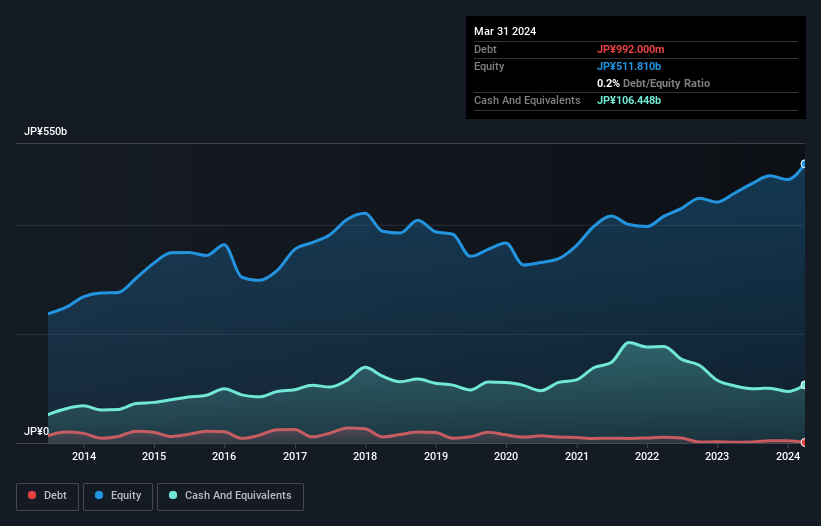Legendary fund manager Li Lu (who Charlie Munger backed) once said, 'The biggest investment risk is not the volatility of prices, but whether you will suffer a permanent loss of capital.' It's only natural to consider a company's balance sheet when you examine how risky it is, since debt is often involved when a business collapses. Importantly, Yamaha Corporation (TSE:7951) does carry debt. But the more important question is: how much risk is that debt creating?
When Is Debt A Problem?
Debt assists a business until the business has trouble paying it off, either with new capital or with free cash flow. In the worst case scenario, a company can go bankrupt if it cannot pay its creditors. While that is not too common, we often do see indebted companies permanently diluting shareholders because lenders force them to raise capital at a distressed price. By replacing dilution, though, debt can be an extremely good tool for businesses that need capital to invest in growth at high rates of return. The first thing to do when considering how much debt a business uses is to look at its cash and debt together.
See our latest analysis for Yamaha
What Is Yamaha's Net Debt?
You can click the graphic below for the historical numbers, but it shows that Yamaha had JP¥992.0m of debt in March 2024, down from JP¥1.49b, one year before. But on the other hand it also has JP¥106.4b in cash, leading to a JP¥105.5b net cash position.

How Healthy Is Yamaha's Balance Sheet?
Zooming in on the latest balance sheet data, we can see that Yamaha had liabilities of JP¥105.7b due within 12 months and liabilities of JP¥49.3b due beyond that. Offsetting this, it had JP¥106.4b in cash and JP¥88.0b in receivables that were due within 12 months. So it can boast JP¥39.4b more liquid assets than total liabilities.
This surplus suggests that Yamaha has a conservative balance sheet, and could probably eliminate its debt without much difficulty. Simply put, the fact that Yamaha has more cash than debt is arguably a good indication that it can manage its debt safely.
In fact Yamaha's saving grace is its low debt levels, because its EBIT has tanked 37% in the last twelve months. When it comes to paying off debt, falling earnings are no more useful than sugary sodas are for your health. The balance sheet is clearly the area to focus on when you are analysing debt. But it is future earnings, more than anything, that will determine Yamaha's ability to maintain a healthy balance sheet going forward. So if you're focused on the future you can check out this free report showing analyst profit forecasts.
Finally, while the tax-man may adore accounting profits, lenders only accept cold hard cash. While Yamaha has net cash on its balance sheet, it's still worth taking a look at its ability to convert earnings before interest and tax (EBIT) to free cash flow, to help us understand how quickly it is building (or eroding) that cash balance. Over the last three years, Yamaha reported free cash flow worth 5.8% of its EBIT, which is really quite low. For us, cash conversion that low sparks a little paranoia about is ability to extinguish debt.
Summing Up
While we empathize with investors who find debt concerning, you should keep in mind that Yamaha has net cash of JP¥105.5b, as well as more liquid assets than liabilities. So we don't have any problem with Yamaha's use of debt. The balance sheet is clearly the area to focus on when you are analysing debt. But ultimately, every company can contain risks that exist outside of the balance sheet. To that end, you should be aware of the 1 warning sign we've spotted with Yamaha .
If, after all that, you're more interested in a fast growing company with a rock-solid balance sheet, then check out our list of net cash growth stocks without delay.
New: Manage All Your Stock Portfolios in One Place
We've created the ultimate portfolio companion for stock investors, and it's free.
• Connect an unlimited number of Portfolios and see your total in one currency
• Be alerted to new Warning Signs or Risks via email or mobile
• Track the Fair Value of your stocks
Have feedback on this article? Concerned about the content? Get in touch with us directly. Alternatively, email editorial-team (at) simplywallst.com.
This article by Simply Wall St is general in nature. We provide commentary based on historical data and analyst forecasts only using an unbiased methodology and our articles are not intended to be financial advice. It does not constitute a recommendation to buy or sell any stock, and does not take account of your objectives, or your financial situation. We aim to bring you long-term focused analysis driven by fundamental data. Note that our analysis may not factor in the latest price-sensitive company announcements or qualitative material. Simply Wall St has no position in any stocks mentioned.
About TSE:7951
Yamaha
Engages in the musical instruments, audio equipment, and other businesses in Japan and internationally.
Flawless balance sheet average dividend payer.
Similar Companies
Market Insights
Community Narratives



